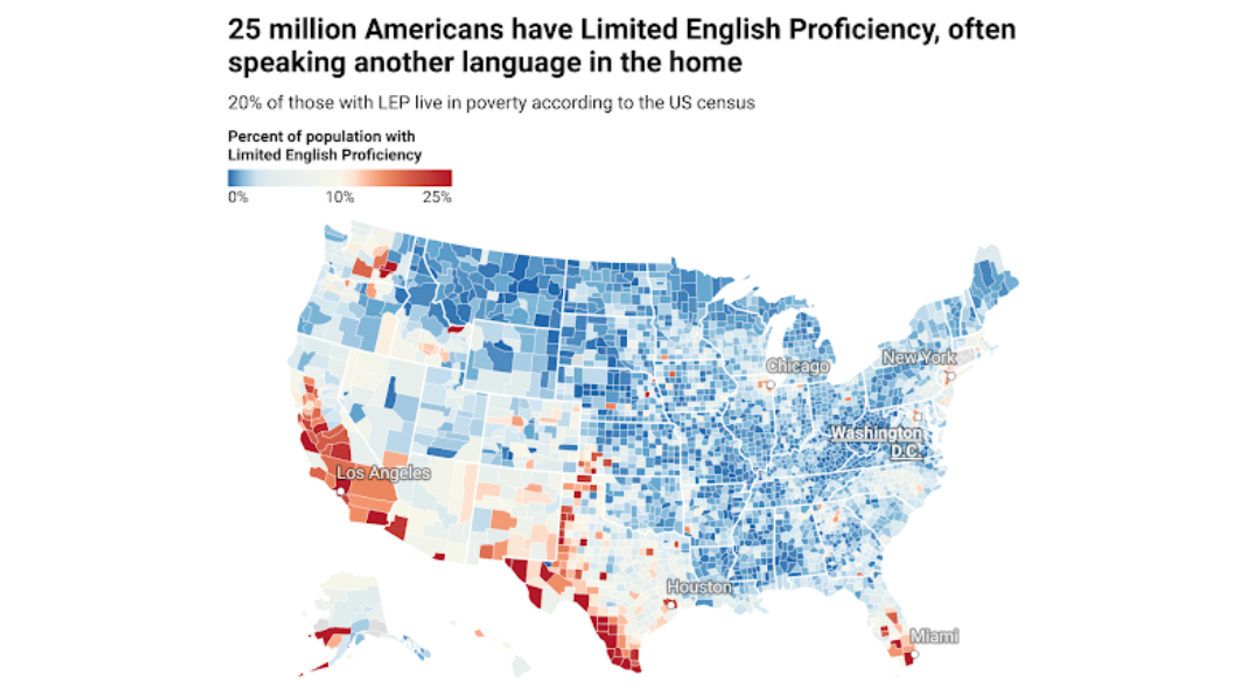Kevin Frazier will join the Crump College of Law at St. Thomas University as an Assistant Professor starting this Fall. He currently is a clerk on the Montana Supreme Court.
Jeremy is the author of American Inequality and an adjunct professor at Presidio Graduate School. His research focuses on the interconnected nature of inequality across regions.
“Una Nación bajo Dios, entera, con libertad y justicia para todos.”
How can a nation promote liberty and justice for all if it does not do its utmost to communicate with its citizens?
More than 75 percent of residents in Miami-Dade County speak a language other than English at home. Nationwide, as of 2019, 70 percent of Latinos ages five and older spoke Spanish at home. In total, upwards of 37 million Americans, at a minimum, would prefer if not benefit from more government resources being available in Spanish.
En otras palabras, esta es una nación mucho diferente de los Estados Unidos cuando Jefferson, Washington, y Hamilton eran las personas más importantes. Even though the number of Americans who speak another language other than English at home has tripled since 1980, the majority of our textbooks and statutes resemble a bygone era.
As long as our schools and systems of government and commerce fail to reflect our multicultural and multilingual society, we will fall short of our collective potential. By way of example, consider that eight states, including Louisiana, still require high school students to pass exit-exams to graduate--despite substantial evidence that such exams disproportionately result in Black and Latino missing out on receiving their diplomas. There is also no evidence that exit exams improve academic achievement or employment rates. For “English Learners” or students who do not speak English as their first language, this out of date insistence on the supremacy of English can come at a cost to the individual student and their community.
Louisiana provides a useful and infuriating case study. In 2019, 80 percent of all Louisiana high school students graduated; yet, for English Learners the graduation rate hovered around 41 percent. This discrepancy can be partially explained by the state’s insistence on assigning exit-exams--the same exams that research suggests fail to actually hold schools accountable for providing students with adequate instruction in core concepts.
The outdated and discriminatory effect of such exams became clear during the pandemic. When several states gave up on exit exams due to the practical difficulties imposed by COVID, graduation rates for English Learners increased seven percent. Es obvio que esta práctica debe permanecer en el pasado.
A multilingual education system and economy would lift up communities across the country. As evidenced by the graphic, there are pockets of the country where an outdated systemic bias toward English has caused poverty to spread where diverse, multilingual systems could blossom. In Starr County, Texas, one in two residents lacks proficiency in English. It’s the least English-speaking county in America. One in three people there live in poverty – the median income is $31K. White students graduate at a 25% higher rate than Hispanic students.
Meanwhile, in Miami-Dade County, Florida, one in three residents lack English proficiency and yet the median income is nearly twice as high. Additionally, there is a much smaller gap in high school graduate rates. In 2019, Hispanic students in Miami had 89% graduate rate and White students had a 93% graduate rate. Miami has embraced Spanish and also helped English become its most studied language, ensuring that students thrive regardless of their first language.
An increase in Spanish in our school and legal system would not transform Starr County into Silicon Valley. No esa la meta. In some parts of the country, an excessive focus on English proficiency has unnecessarily and irrevocably robbed communities of graduates--as well as future leaders and entrepreneurs.
Just as other countries have long insisted on providing students with a multilingual education and distributing government materials in several languages, the United States must recognize that a global, interconnected world will not prioritize English. Es difícil hablar una lengua nueva. But when has America ever been the country that cowers when challenged?

















 "On the Frontlines of Democracy" by Nonprofit Vote,
"On the Frontlines of Democracy" by Nonprofit Vote,

Trump & Hegseth gave Mark Kelly a huge 2028 gift